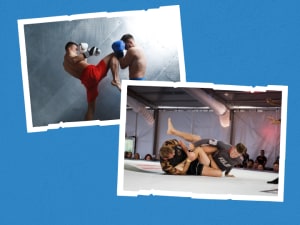
The world of martial arts offers a diverse range of disciplines, each with its own unique techniques, strategies, and benefits. Two popular martial arts that often capture the spotlight are Brazilian Jiu-Jitsu (BJJ) and Muay Thai. While both are effective in their own right, they have distinct approaches and focuses. In this blog, we'll dive into the key differences and similarities between Brazilian Jiu-Jitsu and Muay Thai, helping you make an informed decision on which path to pursue.
Origin and Philosophy:
Brazilian Jiu-Jitsu traces its roots back to Japanese Jujutsu, but it gained prominence in Brazil as it evolved into a ground-based grappling art. BJJ emphasizes leverage, technique, and positional control, allowing smaller practitioners to overcome larger opponents.
Muay Thai, on the other hand, originates from Thailand and is known as "The Art of Eight Limbs." It places a heavy emphasis on striking techniques, using fists, elbows, knees, and shins to deliver powerful blows. Muay Thai's philosophy revolves around conditioning and discipline, creating warriors who are both physically and mentally strong.
Techniques and Focus:
Brazilian Jiu-Jitsu:
BJJ is primarily focused on ground fighting and submissions. Practitioners learn to control opponents using joint locks and chokeholds, utilizing leverage and technique to overcome brute strength. The art values patience and strategic positioning, allowing practitioners to neutralize threats and submit opponents without relying solely on physical attributes.
Muay Thai:
Muay Thai is renowned for its striking techniques, incorporating punches, kicks, elbows, and knees to create a comprehensive stand-up fighting system. Practitioners develop striking skills, footwork, and clinching techniques. Conditioning is a crucial aspect of Muay Thai training, as the art demands cardiovascular fitness and durability to withstand both offensive and defensive exchanges.
Training and Physical Benefits:
Brazilian Jiu-Jitsu:
BJJ training often involves live sparring sessions known as "rolling." This provides practitioners with a realistic understanding of their techniques' effectiveness. The art promotes flexibility, core strength, and mental agility. BJJ is well-suited for individuals who prefer intellectual challenges, problem-solving, and a methodical approach to combat.
Muay Thai:
Muay Thai training includes intense pad work, bag work, and sparring sessions. The art's emphasis on striking provides an exceptional cardiovascular workout and improves coordination and reflexes. Practitioners also develop mental toughness and confidence through rigorous training. Muay Thai appeals to those seeking a high-energy, adrenaline-pumping experience.
Self-Defense and Application:
Brazilian Jiu-Jitsu:
BJJ is often hailed for its practicality in real-life self-defense situations. The art's focus on ground control and submissions can neutralize aggressors without causing excessive harm, making it an excellent option for self-protection while minimizing potential legal repercussions.
Muay Thai:
Muay Thai's striking techniques can be effective in self-defense, especially in scenarios where keeping a distance from an aggressor is necessary. The art's conditioning also provides the physical fitness needed to escape dangerous situations.
In the realm of martial arts, while both Brazilian Jiu-Jitsu and Muay Thai are invaluable disciplines, Brazilian Jiu-Jitsu stands out as an art that transcends physicality and delves into the realm of strategic mastery and adaptability. BJJ's emphasis on leverage, technique, and mental agility equips practitioners with the ability to neutralize opponents through control and submissions, regardless of size or strength disparities. Beyond the confines of the training mat, BJJ's problem-solving approach lends itself seamlessly to real-life self-defense scenarios, offering a level of restraint and precision that aligns with ethical considerations. As a lifelong pursuit, Brazilian Jiu-Jitsu not only forges physically capable individuals but also cultivates a profound understanding of human mechanics, patience, and the art of calculated execution, making it a truly comprehensive and transformative martial art.
Ultimately, the choice between Brazilian Jiu-Jitsu and Muay Thai depends on your personal preferences, goals, and inclinations. If you're captivated by powerful strikes, intense conditioning, and the thrill of standing combat, Muay Thai could be the perfect fit. On the other hand, if you're drawn to cerebral challenges, intricate techniques, and the art of control, Brazilian Jiu-Jitsu might be your calling.

Here at Global1BJJ Brazilian Jiu-jitsu Naples, we have students from white belt to black belts, and students with purple and blue as well as brown belts in between. At Global1BJJ, you will get the rare opportunity to train under a 7x World Champion Deninho, head instructor at our BJJ school Naples. Global Jiu-jitsu Naples is built around an inclusive family atmosphere as well as sports competition BJJ. Join us and train with the best BJJ school in Naples Florida. At Global1BJJ, weekday classes run three times a day, a morning class that you can take before going to work, then the noon classes, and finally evening classes.
Join now to avail of our limited offer for new students!
